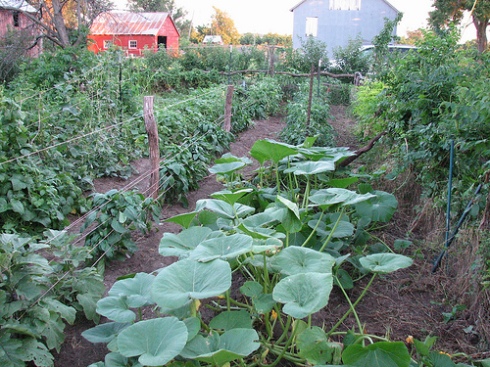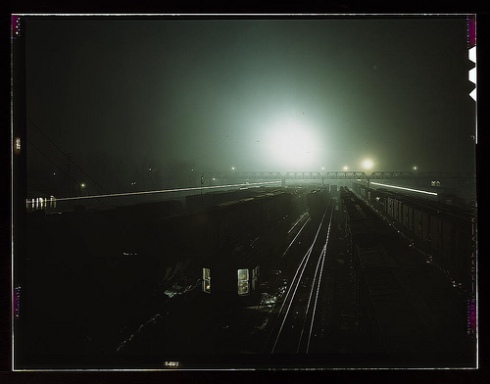Quick, name the women you remember from the Bible that first pop into your head. (and then scroll down past the pictures)
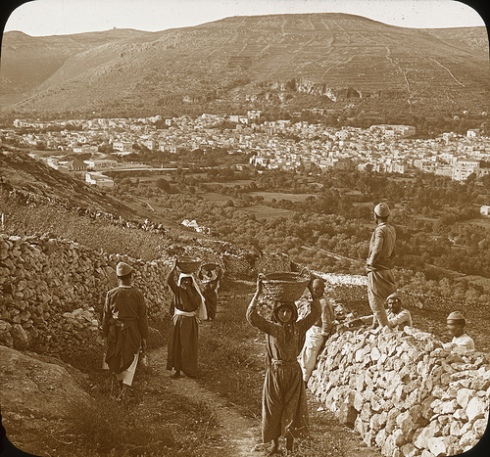
1915 - Shechem and Mount Gerizim, home of Samaritans
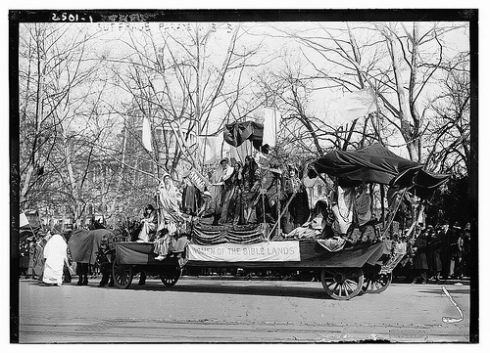
1913 - Women's Suffrage Parade depicting Women of the Bible Lands
Ok, what names came up for you?
Mary, the mother of Jesus? Of course, I’ve celebrated Christmas. Esther, Ruth? Yup, they’ve got Bible books named after them. Eve? Ok, most folks have heard that story. Sarah, Rebecca, Leah? I read the rest of Genesis or I went to Sunday School as a kid.
Mary Magdalene? I’ve heard of the DaVinci Code. Delilah, Jezebel? The bad girls, there’ve been songs about them. Mary and Martha the sisters? Of course, someone’s preached the New Testament to me. Miriam? I’ve read Exodus or watched the Prince of Egypt. Naomi? Cool, I’ve read Ruth. Abigail? Yup, popular name these days. Elizabeth? I read that part of the Christmas story too. Bathsheba? Another bad girl. Well, not really.
Deborah? Oh yeah, she led the Israelites once, right? Rahab? Hmm, she helped those spies? Salome? That was a play, right? Priscilla, Phoebe? Hmm, maybe if I’ve studied the New Testament on my own. Joanna, Susanna? Hmm, maybe I’ve studied the Gospels more in depth too. Junia? Who? Huldah? Huh? Noah? What? Ok, now you’re just messing with me. Noah was a man, of course.
Most of these women, except for the last three, I had encountered somewhere in the first decades of my Christian journey, usually in a Sunday School class, or a discussion with other Christian women, and in my own Bible reading as well. Less frequently, in sermons from the pulpit.
I didn’t become acquainted with Junia until 8 months ago. I was reading a book called What Have They Done with Jesus? by a great Biblical scholar named Ben Witherington III. In the first chapter, he talks about women in Jesus’ ministry and he calls them disciples. Even this was something new for me, as I’d always thought of the “disciples” as the 12 Apostles, who were all men. But Mary, Martha, Mary Magdalene, Joanna, Susanna, and other unnamed women were also disciples who followed him in his ministry and even financed it. And Witherington wrote a few pages about why he thinks that Joanna (Hebrew name) in the Gospels is Junia (Hebrew woman with a Latin name) in Romans. But aside from whether they were one person or two persons, he explained that in the Bible, Junia was an Apostle. A capital A Apostle. Along with Peter and James and Paul. Persons who witnessed the risen Christ and who were commissioned by Him to be missionaries, to teach and preach the Good News, to lay the foundation of the Christian church. This was absolutely stunning for me. I had been told that only men were apostles.
How did I not know this before? Well, Microsoft Word flags Junia as a misspelling as I write this, so she’s obviously too obscure to make into the Microsoft dictionary. Maybe when I read Romans years ago, I was reading from a Bible translation that listed her as Junias (a made-up man’s name) or that didn’t make it clear that she was an apostle (some say, “great to the apostles,” implying that the apostles thought highly of her but that she wasn’t one of them). Or maybe I thought I was already through the “meat” of Romans and was breezing through the end of the book. Maybe I had no clue that Junia was a woman’s name.
I’ve grown up in churches in which women could minister and even get paid for it, but only as leaders and teachers of children, adolescents, or other women, or even as worship music leaders, but not as pastors, preachers, teachers of men, deacons, or elders. Because the Bible doesn’t permit that. Men were the apostles and pastors and preachers in the Bible. Not women. And only men should fill those roles today.
The crazy thing about this is that I never seriously questioned this until the past year. I was raised by a family full of strong women, including an unconventional grandmother who turned down a marriage proposal to become a WWII pilot. I was taught that girls and women could do anything they wanted and grew up truly believing that women could be presidents and CEOs. Through my higher education, I learned about the many ways that women are oppressed in society and opportunities are denied to them, both explicitly and subtly. I’ve learned about and protest against rape myths that make sexual assault seem acceptable. My eyes have been opened to ways that the media and advertising in particular constrains our views of what women should and can be.
But what about women as pastors, preachers, ministers, deacons in the Christian church? Hmm, this idea wasn’t presented to me until much later, and then it was through denominations that I wasn’t a part of, denominations that seemed too liberal to me for other reasons, so it easy to dismiss this ordination of women stuff as something extra-biblical that I didn’t need to explore further. The idea that women shouldn’t be limited in their roles in the church had crossed my mind from time to time, but I didn’t give it serious thought. Honestly, the suggestion that the churches I’ve gone to and go to, the churches that have taught me so much and loved me so well, were intentionally or unintentionally limiting opportunities for women was possibly too much cognitive dissonance for me to examine whether or not that was true in my Christian tradition. Whatever my motivations, I didn’t give the whole women in ministry issue much thought until recently.
Another irony is that it was my conservative (compared to me) seminarian boyfriend who loves biblical scholarship that embraced women in ministry as preachers, teachers, and pastors before I did. One of our recent conversations went like sometime this in a way that I’m completely oversimplifying now:
He – Women can pastor churches.
She – Why?
He – Women led and taught throughout the Bible.
She – Really? Who?
He – Deborah. Miriam. Priscilla. Junia.
She – Oh, yeah. I forgot about Deborah, she led the whole nation of Israel. Wait a minute, are you the feminist in our relationship? Why are you telling me this and not vice versa?
The past few months, I started visiting Episcopal and Anglican churches with my boyfriend and on my own one time, many of which ordain women as priests. There, I’ve been taught by the preaching of women priests and received communion from women priests. While one sermon wasn’t too great, but I wouldn’t have liked it even if a man had delivered it, the other things have been edifying and Spirit filled spiritual experiences, just as if they were led by a man.
I’ve started reading blog posts, many of them written by evangelical pastors and scholars, supporting women in full Christian ministry and the images of God as being both masculine and feminine and beyond gender. Conservative neo-reformed pastors have been making waves in evangelical circles lately with all sorts of statements about how the church should be more masculine. One popular blogger called upon Christian men to write blogs posts that affirm femininity and women in the church.
I’ve read many of these posts, and found them eye-opening and encouraging. Particularly, God’s View of a Woman brought tears to my eyes as I read it. What a beautiful, empowering message for any woman to hear.
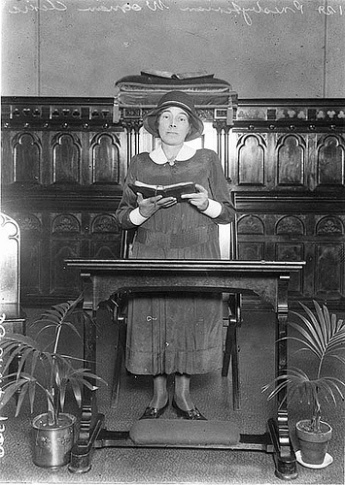
1930's - First woman Presbyterian cleric in Australia
Through this journey, I’m realizing that giving women more roles and leadership in Christian ministry isn’t just a modern feminist thing to do. There’s actual Biblical support for it. Though this is still a controversial topic among many circles, more evangelical scholars and pastors are starting to ordain and advocate for women as deacons and priests and ministers because they’ve studied the Bible and believe that’s what it teaches.
Last night, I read Junia is Not Alone by Scot McKnight on my kindle. In it, McKnight writes about whom Junia was, how she was silenced through incorrect Bible translations, and he tells stories of other courageous Christian women leaders who were silenced. In the final section, McKnight calls on Christians to tell women’s stories from the Bible and church history. Which is why I wrote this post. Junia has been silenced too long and I’m going to write and speak about her and other women and hope that God’s Spirit uses it to open our eyes to the ways that he can use his children for his kingdom.
If you want to learn more about Junia and women in ministry, Junia is Not Alone is a good place to start. I encourage you to read it. It’s only $2.99 on Amazon, it’s just a long essay, and it’s a fast read. You’ll also learn about Huldah, if you haven’t already googled her name after I mentioned her. If you’re already an egalitarian and on board with women in ministry, then reading it will confirm your beliefs and provide you with biblical support. If you don’t think that women should be preaching and leading churches, then I hope this essay and other readings cause you to reconsider your views. I hope it raises some questions for you as reading these things have for me.
At the very least, I hope this book helps you to understand that the churches who do ordain women aren’t just doing it because of the women’s liberation movement, but that there is evangelical Biblical scholarship that supports women in ministry. You may disagree with Witherington and McKnight’s interpretations, but I doubt these old white men who spent their lives studying the Bible are just saying this because they’re crazy, liberal feminists who want to undermine family values. Because they’re respected scholars and many other scholars agree with them, you should give their interpretations a chance.
If God called women to lead and conquer and preach and teach and start the Church in the events proclaimed in the Bible, and if He’s continuing to do so today, who are we to try to get in the way of that? If God calls women today to preach and lead powerfully in churches, if His Spirit equips them with the gifting for those kinds of duties and roles, then why should any mere humans stop that calling? Let’s not let patriarchal systems and our own societal ideas about what men and women can and cannot do prohibit God’s people from doing what he calls them to do.
Tags: Gender Issues, The Kingdom of God
